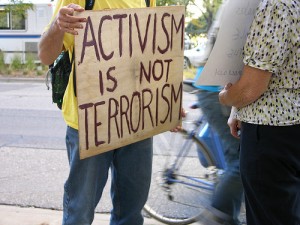 I’ve been hearing two types of responses to the recent raids against peace activists in Minneapolis and Chicago. They sound something like this:
I’ve been hearing two types of responses to the recent raids against peace activists in Minneapolis and Chicago. They sound something like this:
- OMG! This is outrageous! I can’t believe this is taking place in a free country! This must be a mistake.
- The FBI has always done this. Remember COINTELPRO? Spying on MLK? Nothing will ever change.
For those who have never heard about the Green Scare, it is tempting to view recent events as a News of the Weird story: an anomaly wholly separate and distinct from any broader political climate. Viewing government conduct in this way makes it easier to laugh at Keystone Kops antics (which is healthy) and believe government statements that these examples are isolated (which is not).
For those who know about the government’s history of surveilling, harassing and disrupting social movements, news of further misconduct is dismissed in another fashion: business as usual. At best, it is met with deadpan statements about the frequency of such harassment, at worst the FBI visits and raids are viewed as badges of honor. To be very clear, I think it is imperative we place everything going on now in a historical context.
But here’s the thing:
What is taking place now is not an isolated instance, nor is it inevitable. It is the work of real human beings, making real choices, and their actions are dependent on the ignorance–either orchestrated or willful–of the general public.
Through this work I have had the fortune of speaking with people from a variety of backgrounds who aren’t “activists.” I have seen that, time and again, when people learn about what’s going on they are not very surprised. There is a growing, deep-seated distrust of corporate influence and abuses of political power. What people don’t seem to realize is that behind these general feelings of unease are specific campaigns to destroy social movements.
Most people do not sympathize with the financial interests of gas companies, and if they knew, they would be outraged that the Pennsylvania Department of Homeland Security is protecting business interests. Most people know that being a peace activist does not mean you are a terrorist, and if they knew about these raids they would be disgusted. It’s up to us to show them.
We can’t do this, though, if we are only going to pull people from one extreme, of ignorance, to another, of hyper-aware paralysis. If activist communities are going to survive this repression and move forward, and if we are going to welcome others to join us, we must lay claim to a space between the extremes of patriotic naiveté and hopelessness.
If that space does not exist we must create it, and then show others that social change is not about “faith” or “hope,” and it is also not impossible. We can’t turn to presidents and we can’t turn to hopelessness. We can only turn to each other.